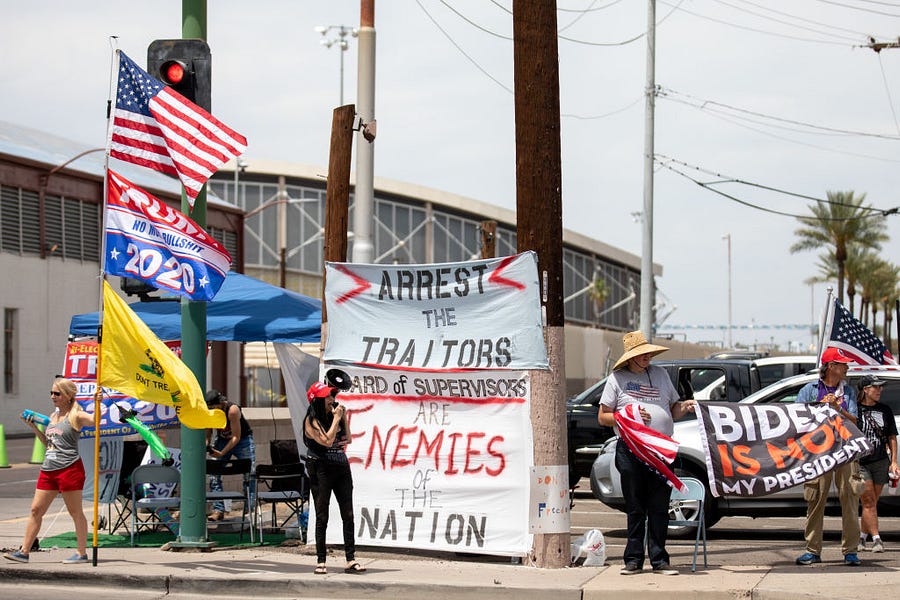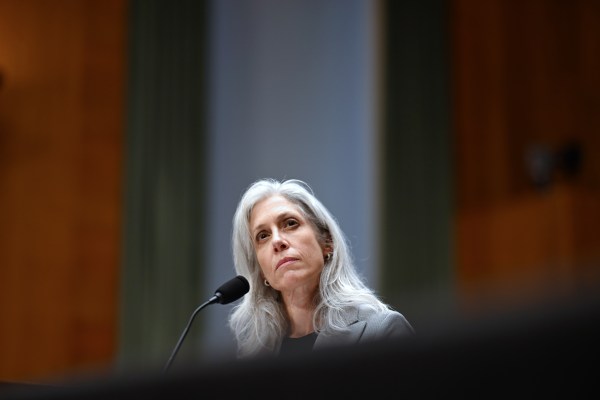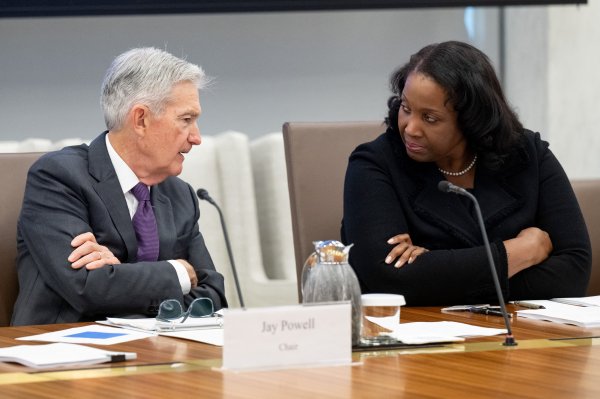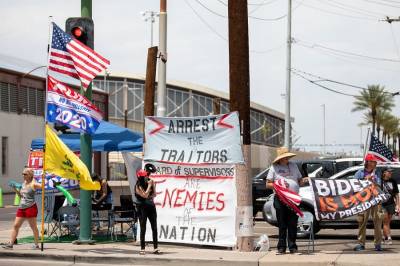Last month, a group of Arizona voters and the progressive non-profit Free Speech For People filed three separate lawsuits in Maricopa County Superior Court against state Rep. Mark Finchem and U.S. Reps. Andy Biggs and Paul Gosar for their respective roles in the January 6 Capitol riot.
The lawsuits argue that Finchem—running for Arizona secretary of state—and Biggs and Gosar—both seeking reelection—participated in the January 6 insurrection in such a way that disqualifies them from holding public office, according to Section 3 of the 14th Amendment, which was ratified after the Civil War. The section, known as the Disqualification Clause, bars anyone from holding public office who “engaged in insurrection or rebellion against the same, or given aid or comfort to the enemies thereof.”
On April 22, Maricopa County Superior Court Judge Christopher Coury dismissed the lawsuits, saying state court didn’t have the jurisdiction to try such a case and that the judicial branch interfering with the legislative branch of government “arguably implicates the doctrines of federalism and separation of powers between the branches of government.” They suits are similar to efforts to disqualify Georgia GOP Rep. Marjorie Taylor Greene and North Carolina GOP Rep. Madison Cawthorn for the same reasons (a federal appeals court is considering a lower court’s dismissal of the lawsuit against Cawthorn, and a Georgia judge has yet to rule on Greene’s case).
The Arizona lawsuits won’t keep Finchem, Biggs, and Gosar from seeking reelection, but they do offer a glimpse into conversations taking place in the Grand Canyon State, which has become ground zero for the “Stop the Steal” movement and election disinformation. Arizona has undergone at least 10 reviews of the 2020 election (which includes both official reviews and several unofficial partisan efforts), none of which have found any evidence of widespread fraud. Yet efforts to overturn that election continue.
The Arizona suits alleged that Gosar and Biggs “were intimately involved in the plans inside the Capitol to reject the electoral votes of several states [and] were engaged in, at minimum, the planning and promotion of events that led to the insurrection.” Similarly, the lawsuit filed against Finchem alleged he was involved in January 6 by “being in close contact with the planners'” of the riot “including throughout the day on January 6” and that he “raced to the Capitol when he heard it was being stormed, despite being warned to stay away.” He also took photographs with insurrectionists and posted “words of encouragement” online, the suit said.
The filings also emphasize that both Gosar and Biggs promoted January 6, not just as citizens but as “sitting members of Congress, insisting to their supporters that there was a legal route to install Trump as president for another four years.”
CNN reported that in December 2020 Stop the Steal organizer Ali Alexander told followers on the video streaming app Periscope that Biggs and Gosar, along with Rep. Mo Brooks of Alabama, were “planning something big.” Biggs denied to CNN that he had worked with Alexander.
The New York Times also reported that on December 22, 2020, Gosar and Biggs met with Trump to discuss the “disenfranchisement of 80 million” who voted for Trump. Finchem, according to the New York Times, attended the rally at the Ellipse on January 6 right before the riot, claiming that he was in Washington to provide evidence of voter fraud in Arizona. Finchem also reportedly joined protesters but did not enter the Capitol building.
In motions to dismiss the original complaints, Biggs, Gosar, and Finchem keep their arguments to procedural matters—that the allegations don’t add up to participating in an insurrection and that the plaintiffs don’t have standing to brings their complaints—and leave the underlying factual allegations unchallenged.
“Nowhere do the Plaintiffs proffer facts indicating (either directly or inferentially) that Congressman Biggs ever condoned, countenanced or encouraged violent behavior by any third party, let alone personally ‘engaged in insurrection,’” Biggs’ attorney wrote.
“The allegations there do not even come close to supporting a conclusion that Congressman Gosar engaged in insurrection,” Gosar’s attorney argued.
Finchem’s response say that “Because Plaintiff fails to allege that Defendant Finchem has been convicted of a crime (much less charged with one), and of course he has not been, then the Complaint must be dismissed for failure to state a claim.”
Free Speech for People filed a notice of appeal.
Aside from the lawsuits, Finchem, Biggs, and Gosar—none of whom responded to The Dispatch’s requests for comment—have consistently promoted baseless election fraud claims, despite no evidence to suggest widespread fraud, in a state flooded with false election claims.
“These aren’t people who did something on January 5 and 6 and then went on with their daily lives,” David Becker, the executive director and founder of the nonpartisan Center for Election Innovation and Research, told The Dispatch. “These are people who are lying to the American people on a daily basis, and those lies have actual consequences.”
Last month, Finchem was a guest on Steve Bannon’s podcast and discussed his plan to “amend the 2020 election,” describing the election as “irredeemably compromised.” Gosar, as recently as May 2, participated in a panel to discuss Dinesh D’souza’s documentary 2000 Mules, which, in Gosar’s words, is “a documentary on how corrupt democrats stole ballots in 2020.” During a January 2022 Trump rally in South Carolina, Biggs, in reference to the January 6 committee, falsely claimed that Nancy Pelosi “created an illegitimate committee to attack any Trump supporter.”
Arizona’s various election reviews include a post-election statutory hand count audit confirming the accuracy of the original machine count, a post election logic and accuracy test, an extensive—and widely criticized—$5.6 million partisan election review by Cyber Ninjas (a Florida-based cybersecurity firm with no experience in election security) that provided no evidence of fraud, an interim report from Arizona Attorney General Mark Brnovich that again provided no evidence of fraud, and a proposal from Finchem that recycled the same debunked claims and baseless “evidence.” Furthermore, in Fall 2021, the Maricopa County Elections Department enlisted Packetwatch, a cybersecurity and incident response firm, to investigate a specific fraud allegation from the Cyber Ninjas report but also found no evidence of such fraud. (Finchem’s attorney in the Disqualification Clause lawsuit has also represented Cyber Ninjas.)
And Arizona is home to a significant number of 2020 election deniers.
There’s Senate President Karen Fann, who hired Cyber Ninjas to conduct a partisan election review. Cyber Ninjas produced an error-ridden report that not only found no evidence of widespread voter fraud but actually found 360 more votes for President Joe Biden.
Arizona state Sen. Wendy Rogers has also consistently promoted election lies. For example, she promoted the false claim that the Cyber Ninjas unofficial election review found 17,322 duplicate ballots in the Maricopa County election dataset. The claim, which The Dispatch has fact checked, is false. As recently as April 26, Rogers tweeted that “Trump won,” which was liked close to 16,000 times and shared almost 3,000 times.
Arizona Republican Party Chair Kelli Ward has also pushed baseless voter fraud claims, and in February 2022 filed a lawsuit against the U.S. House Select Committee on January 6 for subpoenaing her phone records.
Trump-endorsed Arizona gubernatorial candidate Kari Lake, as The Dispatch has reported, is one of the worst offenders on election lies. She’s been an outspoken supporter of the Cyber Ninjas election review, and gave an error-riddled speech at February’s Conservative Political Action Conference focusing primarily on what she described as a “stolen election.” During her speech Lake promoted the long-debunked claim that dead people voted in the 2020 election.
Ron Watkins, a Republican running for Congress in Arizona, is also a suspected QAnon leader, and appeared as an “expert” at Mike Lindell’s failed “cyber forensic symposium” last summer, where he promoted baseless voter fraud claims.
Arizona Attorney General Mark Brnovich falls into this category too. Last month, Brnovich released an interim report on an “initial review of the 2020 election audit.” In response to Brnovich’s review, Republican Maricopa County Chairman of the Board of Supervisors Bill Gates and county recorder Stephen Richer issued a joint statement saying that the report “includes no new evidence, nothing that would have changed the results, and nothing that should lead people to question the overall health of of our electoral system.”
So why has Arizona become a breeding ground for election conspiracy theories? Several analysts offered theories when asked by The Dispatch.
Benny White, an elections expert and data analyst in Tucson, says that Arizona’s elections laws are particularly “simplistic, vague, and ambiguous,” compared to other states. “That’s what our legislators understand,” he said. “They don’t deal with technical details very well.”
According to White, statute 16-452, which authorizes the secretary of state to write an election procedures manual “is extremely ambiguous as to what the secretary must do, should do, or cannot do.” This Arizona statute, he explained, provides a “broad license” to the secretary of state. He noted that the language of the statute is very “permissive” and “the secretaries take advantage of that to write whatever procedures it is that they think should be the policy of the state into the manual.”
Richer, the Republican Maricopa county recorder, thinks weak leadership might be partially responsible for why Arizona has been so heavily involved in the “Stop the Steal” movement.
“We haven’t had anyone who’s been in a position or has chosen to ‘sit down and shut up,’” said Richer. “Sen. [Mark] Kelly and Sen. [Kyrsten] Sinema have engaged zero on this. [Gov.] Doug Ducey’s calculation was always different, but he has engaged as little as possible, so I guess where there is a vacuum, this sort of thing can step in.”
Arizona native Bill Adair, founder of PolitiFact and a professor of journalism and public policy at Duke University, thinks the issue has deeper roots. He theorized that Arizona has always had its share of “mavericks” and has always embraced its “position on the frontier.”
“In grade school in Arizona, we were taught desert survival,” he said. “You know, how to use Saran wrap and the top from an aerosol can to get water if we were stranded in the desert.”
Arizona in its politics, Adair added, has always had renegades, and “the state has embraced Republican politicians who have had that maverick sensibility and a willingness to question things.”
Becker, of the Center for Election Innovation and Research, believes that accountability for officials peddling falsehoods is essential.
“There’s this aspect where we’re constantly trying to think through, are the people who are pushing election denial, who are attacking democracy—are they so angry and upset, and disconnected from reality that to hold them accountable would make things worse?” Becker said. “And I think for some of us, I’d say that's the wrong question. I think accountability is absolutely key here.”







Please note that we at The Dispatch hold ourselves, our work, and our commenters to a higher standard than other places on the internet. We welcome comments that foster genuine debate or discussion—including comments critical of us or our work—but responses that include ad hominem attacks on fellow Dispatch members or are intended to stoke fear and anger may be moderated.
With your membership, you only have the ability to comment on The Morning Dispatch articles. Consider upgrading to join the conversation everywhere.